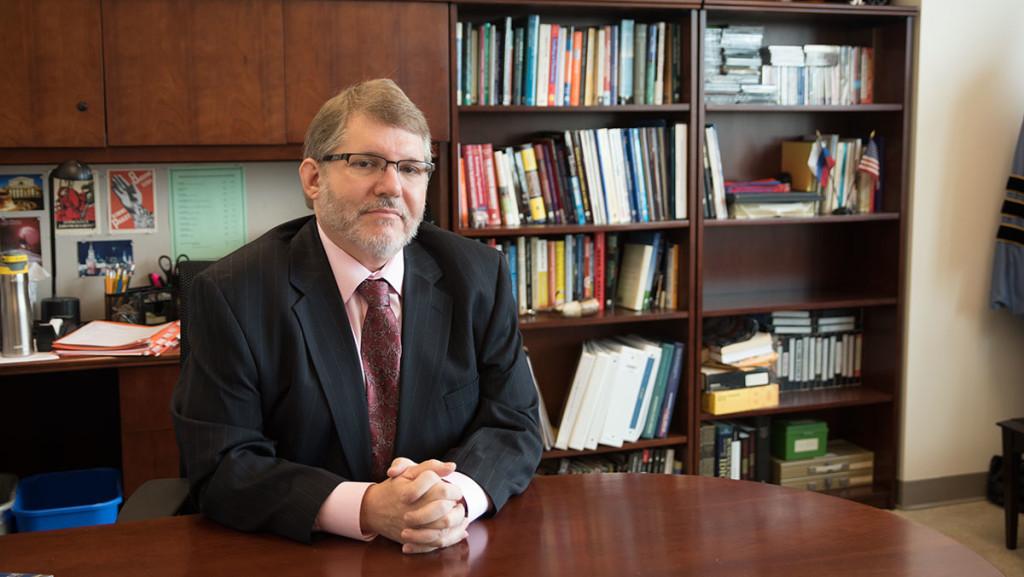Benjamin Rifkin assumed the duties of Ithaca College provost and vice president of educational affairs June 1. Editor-in-Chief Kira Maddox spoke with Rifkin to expand on points he made during his on-campus interview in December, notably about his plans for increasing collaboration at the college, the role of student voices in strategic planning and a number of other ideas set forth in December.
Kira Maddox: One of the things you had mentioned was increasing collaboration among the college community. Is there anything in particular that you would want to see happen as far as how to increase that kind of collaboration?
Benjamin Rifkin: I have worked with the deans and the leaders in the student affairs and campus life area to identify five exemplary projects that … represent an integration of academic and co-curricular activities. … We will, by the end of this year, have an explicitly articulated set of learning outcomes and preliminary data measuring learning outcome achievement to be able to talk about the value and success of these projects on our campus.
KM: Are you allowed to say what the projects are yet, or is that still in the works?
BR: The first project is on strength and conditioning that’s going to involve a class in [the School of Health Sciences and Human Performance] and the athletics division, and something environmental studies … involving the organic garden and Residential Life. Music, gerontology, and recreation and leisure studies will look at music as medicine. … There’s going to be a project on advanced event management. … Then we have a volunteer income tax program that’s going to come out of the School of Business.
KM: The next portion is the learning beyond the classroom area with things like internships and study abroad. Do you have any plans or ideas for those areas?
BR: The learning beyond the classroom is also called … high-impact practices and … transformative learning experiences. … They are study away … internships … [and] undergraduate research. … We also have what I consider to be mentored-inquiry research in the areas of say business or communications where the project that’s being constructed with the students is not necessarily traditional research for discovery, but it is professional activity, and it is creating something new. … We also have the area of music, theater and the other arts where the expression that is created by the student, or the group of students, is a creative work under the guidance of the faculty mentor …
The next category is … service learning … The final thing is what I call experiential learning … It’s being in the field and out of the classroom … It removes the dry, dusty layer from the learning experience and makes things come alive for students.
Research in higher education shows that students who participate in one or more of those experiences … [are] more likely to persist in college and get a degree, they are more likely to be happier about their studies, more engaged in their studies, and they’re also more likely years later to view their studies as meaningful and significant. … For all of them, we want to find ways to expand the opportunities, expand the numbers of participants [and] document outcomes in a way to also help us recruit students to do these things.
KM: The other thing you had mentioned was the idea of strategic changes. Could you explain a little bit about what that involves?
BR: If there’s a change that we can address that’s going to have a large impact on students and make this place substantially better for all of our students, then that’s a change I need to pursue. … Another strategic change is thinking about how we incentivize faculty to do innovative things in their teaching. … By connecting the various disciplines that people study with human beings, we turn a dusty discipline into a significant learning experience. … Our physical therapy students are already out in clinical placements, our journalists are out working for The Ithacan and working on WICB and writing in blogs. … But there are disciplines on campus where that is less immediate … I’m hoping that can be a strategic visioning process for us through the Center for Faculty Excellence and through the departments.
KM: I know when you were on campus there was a protest of students going on, and you had spoken briefly but positively about their actions. Where do you think student input and student voices go as far as strategic changes?
BR: It’s critically important. … Ithaca College is a complex organization whose primary mission is to educate students, but we don’t receive our students as 5-year-olds. You come to us as adults with a world of experience … and we must always — I believe, I do personally — we must as a community value that experience and engage with it, as we are considering change in one or another aspect of our organization, turning to the major stakeholders, which are — to put on the record — not only Faculty and Staff Council, but also Student Government.













